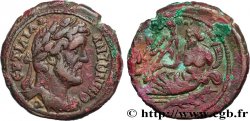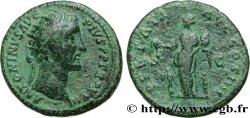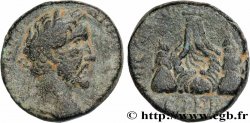bpv_521129 - ANTONINUS PIUS Drachme
Not available.
Item sold on our e-shop (2019)
Price : 2 500.00 €
Item sold on our e-shop (2019)
Price : 2 500.00 €
Type : Drachme
Date: an 17
Mint name / Town : Alexandrie, Égypte
Metal : copper
Diameter : 32,5 mm
Orientation dies : 12 h.
Weight : 21,46 g.
Rarity : R3
Coments on the condition:
Exemplaire dans un état de conservation remarquable pour une monnaie des travaux d’Hercule mais larges traces de monture ancienne ayant touché l’ensemble de la tranche. Patine marron foncé
Catalogue references :
Predigree :
Exemplaire provenant de la collection ENP
Obverse
Obverse description : Tête laurée d’Antonin le Pieux à droite (O*).
Obverse legend : AUT K T AIL ADR -ANtwNEINOS SEB EUS (Autokratoros Kaisaros Titos Ailios Adrianos Antwneinos Sebastos Euseubios).
Obverse translation : (L’empereur césar Titus Aelius Hadrien Antonin auguste pieux).
Reverse
Reverse legend : L .
Reverse description : Hercule debout à droite, bandant son arc des deux mains ; devant, deux oiseaux tombant au sol.
Reverse legend : DEKA-T-OU.
Reverse translation : (An 10).
Commentary
Ce type représentant un des douze travaux d’Hercule fit partie de la série la plus rare et recherchée des monnaies d’Alexandrie ! Un seul exemplaire semble passé en vente ces 20 dernières années, vente TRITON XI, du 8 janvier 2008, lot 530 (12000$ + frais).








 Report a mistake
Report a mistake Print the page
Print the page Share my selection
Share my selection Ask a question
Ask a question Consign / sell
Consign / sell
 Full data
Full data



